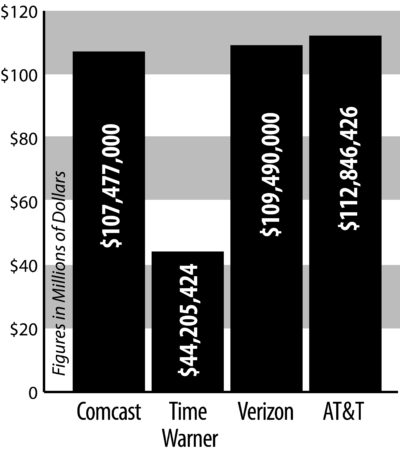
On February 26, Federal Communications Commissioner Tom Wheeler led the Democratic majority on the commission to a 3-2 net neutrality ruling that designated the internet a public utility and prohibits big internet service providers from establishing pay-to-play fast lanes for preferred content providers while slowing content for everyone else.
By classifying the internet as a public utility under Title II of the 1996 Telecommunications Act, the Democratic majority insulated the FCC against the sort of lawsuits that blocked the commission’s earlier efforts.
The fight over net neutrality now moves to the Congress, where Republican Speaker John Boehner has promised legislation that would counter the FCC ruling. The big internet service providers that oppose net neutrality have spent large sums of money lobbying Congress, now their last best hope to block net neutrality.
Between January 1, 2008, and December 31, 2014, cable giants Comcast, Time Warner, Verizon, and AT&T have together spent more than $374 million in a lobbying campaign to block net neutrality legislation or rule making.

Net neutrality legislation will move through the House Communications and Technology Subcommittee, which held a hearing on the topic the day before the FCC ruled.
Republicans in Congress, in fact, were using House committee hearings to warn the FCC of the fight that would ensue if the commission were to act on net neutrality.
Republican congressmen Fred Upton (MI) and Greg Walden (OR) chair the two House committees that oversee the FCC. A month before the commission’s February 26 ruling, they held a joint committee hearing designated: Protecting the Internet and Consumers through Congressional Action.
The four big internet service providers contributed $99,500 to Upton and $56,800 to Walden during the 2014 election cycle. House Speaker Boehner has received $75,450 in money from big cable companies.
By early March, a House Republican had delivered on Boehner’s promise of legislation aimed at the FCC. Tennessee Republican Rep. Marsha Blackburn filed the first anti-net-neutrality bill two weeks after the commission’s decision. Her Internet Freedom Act would overturn the net neutrality rules and limit FCC regulation of the internet. She received $80,000 in cable company money last electoral cycle.
Lou Dubose is the editor of The Washington Spectator.
Source: MapLight, a nonpartisan research organization that reveals money’s influence on politics.
Originally posted at The Washington Spectator.
Photo: Speaker John Boehner and Senate Majority Leader Mitch McConnell meet in the U.S. Capitol on January 7, 2015. (Official Photo by Caleb Smith; Speaker Boehner/Flickr)


